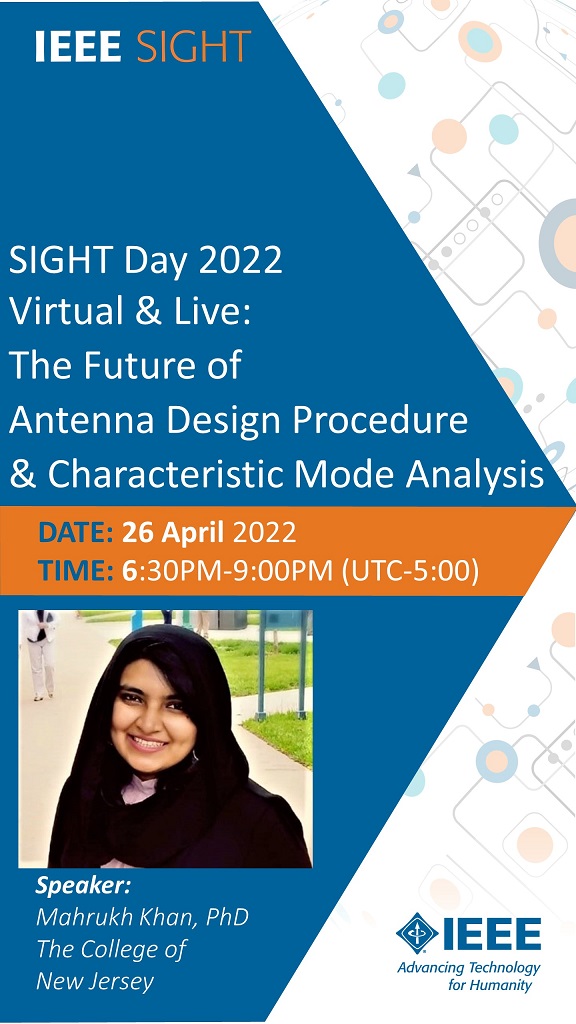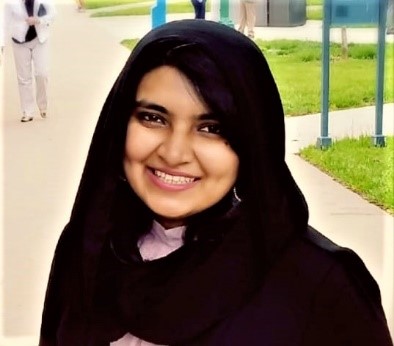IEEE SIGHT Day: Future of Antenna Design Procedures and Characteristic Mode Analysis
In-Person and Virtual - The Best of Both Worlds

Celebrate IEEE SIGHT Day with Dr Mahrukh Khan, PhD of The College of New Jersey with IEEE NJ Coast SIGHT Group and IEEE PACE.
Today's researchers will innovate and create the future to improve communication and bridge the digital divide for everyone consistent with the United Nations Sustainable Development Goals. Be inspired to be part of the potential for the future advances of technology for humanity.
Microstrip antennas are in massive demand for several emerging applications such as biomedical devices, ultrawideband communication devices, radar applications, etc. Microstrip antennas are inherently narrowband and low gain antennas. Since their inception, various methods have been introduced to improve them. Most of the methods depend on the software that needs unlimited optimization runs, which increases the antenna design's computation cost. Theory of Characteristic Modes (TCM) is the powerful analysis technique that made antenna structure easy to understand and comprehend. As it gives physical insight into the antenna's structure, the analysis and design of the antenna may not need many optimization cycles. It was first introduced in the 1970s, but it was not till 2007 that this method hit the modern world again for planar antenna design. The reason behind the unmatched success of this method was the details it gives about the surface current behavior of the antenna in a user-friendly manner. Since then, CMA (Characteristic Mode Analysis) has been successfully applied to analyze planar structures and helps design and improve specific characteristics of antennas. Most of my research focused on designing and optimizing the UWB antennas using CMA. CMA can fully illustrate antenna structure with a finite number of resonant modes. Hence, it has the potential of simplifying complicated and tedious antenna design procedures.
This talk will focus on the following: (a) Can characteristic modes analysis define the future of antenna design procedures by helping to reduce the complexity of antenna design procedure? (b) the possibilities of producing the compact and efficient antenna design using characteristic modes. (c) how surface currents can be controlled to produce optimized antenna designs.
Date and Time
Location
Hosts
Registration
-
 Add Event to Calendar
Add Event to Calendar
Loading virtual attendance info...
- Starts 23 April 2022 08:03 PM UTC
- Ends 26 April 2022 10:00 PM UTC
- No Admission Charge
- Menu: Pizza and Water/Soda
Speakers
 Dr. Mahrukh Khan, Ph.D. of The College of New Jersey (TCNJ)
Dr. Mahrukh Khan, Ph.D. of The College of New Jersey (TCNJ)
Future of Antenna Design Procedures and Characteristic Mode Analysis
Biography:
Mahrukh Khan is working as an Assistant Professor in the Electrical and Computer Engineering Department at The College of New Jersey (TCNJ). She received her Bachelor of Science and Master of Science degree in Electrical Engineering from the University of Engineering and Technology, Lahore, Pakistan, in 2007 and 2011. Dr. Khan received her Ph.D. degree in Electrical Engineering from the University of Missouri-Kansas City, Kansas City, Missouri, USA, in 2017. Later, she worked as a Post-Doctoral Fellow in Nano and Micro Electronics Lab at UMKC. In early 2020, She worked as an Assistant Research Professor in the Missouri Institute of Defense and Energy (MIDE).). She has published more than 20 articles and conference papers in renowned journals and peer-reviewed conferences in her field of research. Her research articles and conference papers have received more than 180+ citations in a short period. She has won an honorable mention in the International 2015 Altair FEKO student competition. She has also won the prestigious UMKC School of Graduate Studies (SGS) fellowship for her outstanding research. She got the UMKC Women Council Fellowship award in 2015 and 2016. In 2016, She also selected as the UMKC Outstanding Graduate Student award at the CSEE department. Recently Dr. Khan was selected as an IEEE APS Young Professional Ambassador. Dr. Khan is 1 of 12 members chosen from across the globe. She has served as a reviewer of top-notch peer-reviewed journals such as IEEE Antennas and Propagation Magazine, IET Microwaves, Antennas, Propagation, etc. She is an active member of IEEE Young Professionals and IEEE Women in Engineering Societies.
Email:
Address:TCNJ - School of Engineering, Department of Electrical & Computer Engineering, Ewing, United States
Agenda
Dinner - Pizza and Water/Soda Talk followed by Q&A
IEEE SIGHT Day Be Inspired to Advance Technology for Humanity: The Future of Antenna Design

